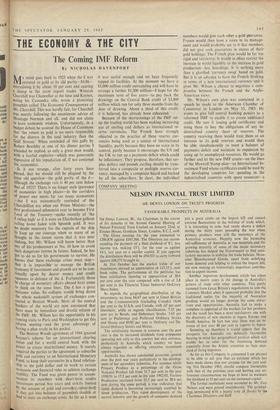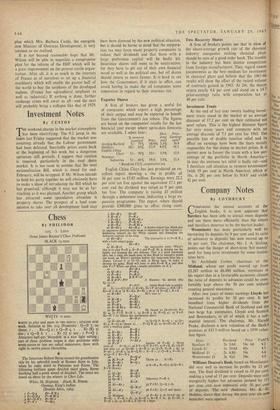THE ECONOMY & THE CITY
The Coming IMF Reform
By NICHOLAS DAVENPORT
My mind goes back to 1925 when the £ was restored to gold at its old parity—$4.86- overvaluing it by about 10 per cent and causing a slump in the main export trades. Winston Churchill was Chancellor at the time and Keynes, acting his Cassandra role,' wrote a protesting Pamphlet called The Economic Consequences of Mr'. Churchill. This was hardly fair, for Churchill Was merely following the unanimous advice of Montagu Norman and all, and did not claim to have economic wisdom. Unfortunately, in a budget debate he assured the House of Commons that 'the return to gold is no more responsible for the distress in the coal industry than the Gulf Stream.' When reminded of this gaffe by Robert Boothby at one of his dinner parties I attended he replied, as only a great man would, With a fearful expletive—which was generously expressive of his repudiation of, if not contempt for, economics.
Is it not strange, after forty years have Passed, that we should still be plagued by the Same old question—the gold parity of the £- although the exchange rate is 40 per cent below that of 1925? There is no longer such ignorance of economics in high places—in the corridors of power one meets far too many economists —but I was momentarily reminded of the Churchillian era when our Prime Minister—the first professional economist ever to become First Lord of the Treasury—spoke recently of 'the riding high' as if it were an Elizabethan galleon
sailing home laden with Spanish gold. It was no doubt necessary for the captain of the ship to keep up our courage when so many of us thought in the recent storm that it was near sinking, but Mr. Wilson will know better than any of his predecessors at No. 10 how to avoid such dangerous storms in future. Indeed, he has Sot to do so for his government to survive. He Knows that these exchange crises must stop— that it is impossible' to manage the British economy if investment and growth are to be con- tinually upset by dearer money and credit Squeezes in defence of the E. Fortunately those In charge of monetary affairs abroad have come 10 think on the same lines. The £ has a great nuisance value. Its collapse would bring down the whole makeshift system of exchanges con- cocted at Bretton Woods. Most of the central bankers of the world are now convinced that there must be immediate and drastic reform of the IMF. Mr. Wilson has the opportunity in his coming visits to Paris and Washington -to get this reform moving—and the great advantage of having a plan ready in his pocket.
The Bretton Woods agreement of 1944 ignored
Keynes's scheme for an international clearing union and for a world central bank with the Power to create international money. It merely required the parties to the agreement to subscribe gold and currency to an International Monetary Fund, to keep their currencies in a fixed relation- ship to the gold dollar and to work to certain economic and financial rules to achieve exchange stability. The Fund was given power to accom- modate its members with short-term credits (maximum period five years and strictly limited by the amount of gold and currency subscribed) if they got into balance of payments trouble or had to meet an exchange crisis. As far as it went
it was useful enough and we have frequently tapped its facilities. At the moment we have a $1,000 million credit outstanding and will have to arrange a further $1400 million—I hope for the maximum term of five years—to pay back the drawings on the Central Bank credit of $3,000 million which run for only three months from the date of drawing. About a third of this credit. it is believed, has already been exhausted.
Because of the shortcomings of the IMF set- up the trading world has been making increasing use of sterling and dollars as international re- serve currencies. The French have strongly objected to the practice of these reserve cur- rencies being used as .a source of international liquidity, partly because they have no voice in its control, partly because it encourages the US and the UK to run up a payments deficit which could be inflationary. They propose, therefore, that sur- plus dollars and pounds sterling should be trans- ferred into a composite or multiple reserve cur- rency, managed by a composite board and backed by all the subscribers. In short, the individual
members would give each other a gold guarantee. France would then have a voice in its manage- ment and would probably see to it that members did not give such guarantees in excess of their' gold holdings. The French plan would be far too rigid and restrictive. It would in effect restrict the increase in world liquidity to the increase in gold production—less hoardings. It is nothing more than a glorified 'currency swap' based on gold. But it is an advance to have the French thinking in terms of a new international currency and it gives Mr. Wilson a chance to negotiate a com- promise between the French and the Anglo- American views.
Mr. Wilson's own plan was contained in a speech he made to the American Chamber of Commerce in London on May 15, 1963. He wants to give full central banking powers to a reformed IMF to enable it to create additional credit. He sees it issuing gold certificates and using them to buy the obligations of any in- dustrialised country short of reserves. The country receiving them would treat them as an increase to its gold reserves and , would then be able simultaneously to meet a balance of payments deficit and maintain its cxpansion by using up its unemployed resources. He would go further and let the new IMF create—on the lines of the Maxwell Stamp plan—an International In- vestment Fund whose certificates could be used by the developing countries for spending in the industrialised countries with spare resources--a
plan which Mrs. Barbara Castle, the energetic new Minister of Overseas Development, is very anxious to see realised.
It is not beyond reasonable hope that Mr. Wilson will be able to negotiate a compromise plan for the reform of the IMF which will be a great improvement on the present sterile organ- isation. After all, it is as much in the interests of France as of ourselves to set up a financial machinery which will enable the poorer half of the world to buy the surpluses of the developed nations. (France has agricultural surpluses as well as industrial.) If nothing is done, further exchange crises will await us all--and the next will probably bring a collapse like that of 1929.



































 Previous page
Previous page